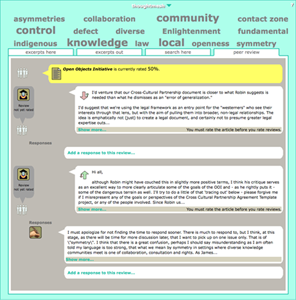 ThoughtMesh developers Craig Dietrich and John Bell have just launched a sophisticated reviewing system internal to the ThoughtMesh open publication platform.
ThoughtMesh developers Craig Dietrich and John Bell have just launched a sophisticated reviewing system internal to the ThoughtMesh open publication platform.
Unlike the relatively uncontrolled comments at a site like YouTube, ThoughtMesh’s reviews are subject to a rigorous trust metric. Each reviewer must claim a level of expertise before rating an article, and the software holds them accountable in a way that even the rigorous method of peer reviewers for academic journals do not achieve.
As might be expected, a review by someone claiming expertise will have more effect on the overall rating of the essay than by someone who claims none. However, those who claim expertise have to live up to it. If an academic makes exaggerated claims and is then trashed by her peers, her credibility will plummet faster than if she claimed no expertise in the first place.
You can see a sample discussion by clicking on the “peer review” tab of Robin Boast’s paper “Open Objects Initiative: A Critique of Openness.”
The release of this peer review feature is good timing, given MIT’s recent publication of the University of Maine’s new criteria for 21st-century academics.
